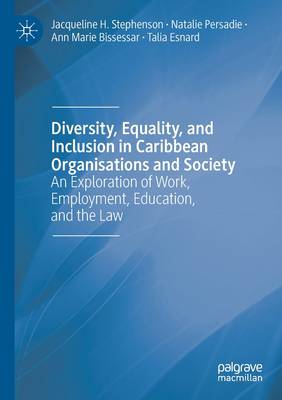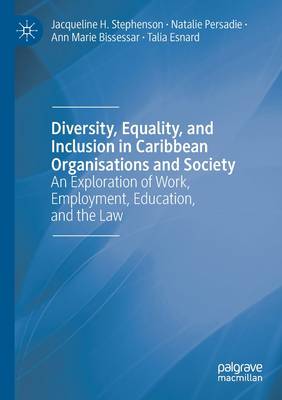
- Retrait gratuit dans votre magasin Club
- 7.000.000 titres dans notre catalogue
- Payer en toute sécurité
- Toujours un magasin près de chez vous
- Retrait gratuit dans votre magasin Club
- 7.000.0000 titres dans notre catalogue
- Payer en toute sécurité
- Toujours un magasin près de chez vous
Diversity, Equality, and Inclusion in Caribbean Organisations and Society
An Exploration of Work, Employment, Education, and the Law
Jacqueline H Stephenson, Natalie Persadie, Ann Marie Bissessar, Talia EsnardDescription
Chapter 1 - Introduction (J. Stephenson and A. Bissessar)
This chapter offers an introduction (and overview) to the concept of diversity, discrimination, inclusion and equality in the Caribbean. It will include: -
- General discussion on culture in the Caribbean
- Discussion of heterogeneity in the Caribbean region
- An examination of the ways in which this book addresses the challenge of the paucity of diversity research in the Caribbean region
- Objectives of the book
- An overview of the book and introduction of the chapters to follow
Chapter 2 - Race Relations in the Caribbean- Re-evaluating Representative Bureaucracy in Trinidad & Tobago and Guyana (A. Bissessar)
The relationship between groups has always been problematic whether the difference between the groups are based on different religious viewpoints (for instance between Hindus or Muslims as in the case of Pakistan and Indian), differences in tribes (for example Rwanda), or differences in caste (for example India). The array of differences between groups is vast. However, the gap widens when 'race' or 'racial' differences become one of the more pertinent issues between the dominant groups in a society.In the case of the countries of the Anglophone Caribbean, much has been written on race (Lowenthal, 1970); race and class (Safa, 2012); race, class and identity (Reddock, 2014) as well as the connection between race and politics (Bissessar & La Guerre, 2013). Indeed, there is no dearth of literature on race relations in the Caribbean, more specifically the relationship between the African and East Indian groups. This paper will try to evaluate, particularly in two countries that have been categorized as 'plural' societies (Trinidad and Tobago and Guyana), the extent to which the mechanisms which have been introduced to minimize or manage the racial segregation of the groups have been successful.
This chapter will focus specifically on the mechanisms that have been introduced in the public sector of Trinidad and Tobago and neighbouring Guyana to allow for the representation of various groups. The paper will examine the challenges that emerged during the 1960s to the 1990s. The paper will then look at the various mechanisms that have been introduced since the 1990s and evaluate the extent to which these mechanisms or processes have allowed for more diversity within this sector.Chapter 3 - Equality and discrimination on the basis of sex (J. Stephenson)
This chapter will focus on the extent to which sexes are equitably perceived and included in organisations across the Caribbean region. Caribbean societies are largely patriarchal in nature. Relative to women, men have more key political, organisational and societal roles. This may be attributed in part, to the region's history of colonization and enslavement, where males were regarded as more valuable than females, who in turn were thought to have a supporting role. Over time, these have become social norms which are now imbedded across the islands of the region. This dichotomy is further evident in disparities in remuneration, opportunities for promotion and development, power and control and is reinforced through organisational hierarchies, symbols, images, interactions and accepted behaviour (Acker, 2006). In an attempt to redress the balance in terms of remuneration, some Caribbean islands have also implemented equal pay legislation. Women in the Caribbean remain overpopulated in occupations which are the lowest paid and least skilled, e.g. domestic workers and shop assistants (CDB, 2016; Miller, 1997).Chapter 4 - Sexual orientation and inclusivity in the region (J. Stephenson)
This chapter will discuss the following: -
- The acknowle
Spécifications
Parties prenantes
- Auteur(s) :
- Editeur:
Contenu
- Nombre de pages :
- 256
- Langue:
- Anglais
Caractéristiques
- EAN:
- 9783030476168
- Date de parution :
- 18-09-21
- Format:
- Livre broché
- Format numérique:
- Trade paperback (VS)
- Dimensions :
- 148 mm x 210 mm
- Poids :
- 358 g

Les avis
Nous publions uniquement les avis qui respectent les conditions requises. Consultez nos conditions pour les avis.






